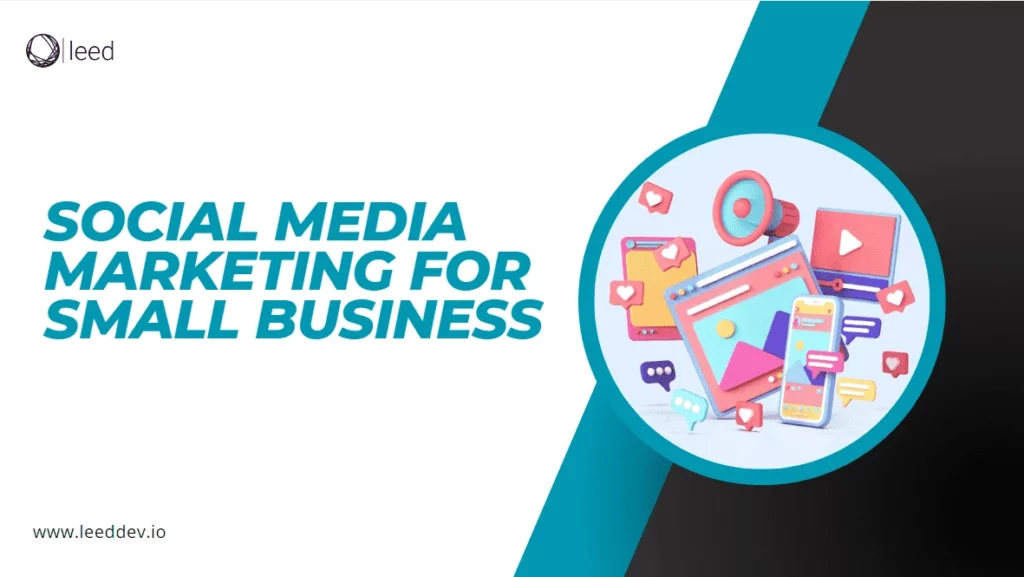As a small business owner, you’ve likely heard that social media marketing solutions are crucial for growing your brand. With so many platforms, strategies, and tips, it can feel confusing sometimes. That’s where Leed Software Development steps in. Our team specializes in social media marketing for small businesses. We will help you connect with your audience, boost engagement, and increase sales.
Why Social Media Marketing for Small Business is Important?
In today’s digital world, your customers are online and so are your competitors. Social media platforms like Facebook, Instagram, LinkedIn, and Twitter have billions of active users. That means your small business has a huge opportunity to get in front of the right people. But how do you take advantage of this? That’s where social media marketing for small businesses comes in.
- Social media for small business marketing comes with a wider reach. Over 4.7 billion people are active on social media worldwide. This vast audience represents a significant opportunity for small businesses to expand their visibility.
- Social media marketing is often more affordable than traditional advertising methods. You can effectively reach your audience with a minimal budget, especially through targeted ads.
- Social media allows for direct interaction with customers, fostering relationships and trust that can lead to increased loyalty.
How to Use Social Media Marketing for Small Businesses
Understanding which platforms can best serve your marketing goals is essential. Here are some of the most effective social media platforms for small businesses. You can learn how to use social media marketing for small businesses.
1. Identify and Plan Smart Goals
SMART goals are targets that meet five criteria: specific, measurable, attainable, relevant, and timely. Setting goals for your social media marketing techniques can help you stay focused and effective.
Specific: Firstly ask yourself why your small business uses social media. Determine the specific purpose of your strategy and which channel will help achieve it.
Measurable: Which data point or measure is the most important to your business? Measurable goals should be the most important data point for your business.
Attainable: Is your aim attainable? Ensure your goals are attainable.
Relevent: Are your goals relevant to the overarching objectives of your company? Also, are your strategies pertinent to your customers? If your content isn’t relevant, users will scroll right past it.
Timely: Choose a timeframe that allows time to evaluate the effectiveness of your strategies, such as quarterly goals, to avoid committing to an ineffective strategy for too long.
2. Identify your Target Audience
You can get viral on social media but the thing that matters is the quality of your audience. The more better quality audience you have the more your business will grow. Som makes sure your content is not only just reaching social media but also visible to your target audience. Your target audience will support your business.
3. Choose the Right Social Media Platforms
The first step to building a solid social media presence is selecting the platforms that suit your business. You don’t need to be active on every platform, just the ones where your audience is most engaged.
1. Facebook
With 2.96 billion monthly active users, Facebook remains the largest social media platform. Facebook’s advertising platform allows for precise targeting, enabling businesses to reach specific demographics, interests, and behaviors. Facebook is a conversational platform, but consumers are likely looking for updates about future sales, promotions, new products, or events.
2. Instagram
Instagram boasts 1.4 billion monthly active users, with a significant focus on visual content. Instagram is a popular social platform with a large user base, offering various posting formats like short-lived stories and permanent posts. Content on Instagram varies, with posts being photos, images, or videos. Stories are casual and conversational, ideal for e-commerce brands. Posting is crucial for quality and consistency. 70% of shoppers turn to Instagram for product discovery, highlighting its role in driving sales.
4. Twitter
Twitter has around 450 million monthly active users. Business profiles can share product promotions, contests, sales, industry insights, and new releases. Posting multiple times per day maximizes engagement with followers. To boost engagement, provide value to followers, and be playful, keeping your content light and bright.
5. TikTok
TikTok has exploded in popularity, with over 1 billion monthly active users. This platform is centered on short-form video content, making it perfect for creative marketing. Businesses can use TikTok to showcase products, share behind-the-scenes content, and engage younger audiences. 68% of TikTok users say they prefer to watch content from brands, emphasizing its effectiveness for engaging consumers.
6. Pinterest
Pinterest has 450 million monthly active users, primarily focused on inspiration and discovery. This platform is perfect for businesses that rely on visual content, such as fashion, home decor, and DIY. Users often use Pinterest for planning and inspiration, making it a powerful tool for driving traffic to your website. 85% of Pinterest users have purchased a product after seeing it on the platform, showing its effectiveness in converting interest into sales.
4. Create High-Quality, Valuable Content
Your content is the cornerstone of social media success. The goal is to create posts that provide real value, whether informative, entertaining, or inspiring.
- Showcase your team, work process, and daily business operations.
- Share success stories and reviews to build trust and credibility.
- Provide educational content that solves problems your audience may have.
- Use engaging visuals such as images, infographics, and videos to capture attention.
Creating consistent, high-quality content can be time-consuming. With our content management solutions, you can efficiently plan, manage, and track your content in one place. It ensures a smooth workflow and professional presentation.
5. Engage with Your Audience Consistently
Social media is a two-way street. Posting alone won’t get you the engagement you need. You have to actively engage with your followers to build loyalty.
- Timely responses show that you value your customers.
- Participate in trending topics related to your industry to keep your business relevant.
- Invite your customers to share their experiences with your product or service.
To maintain consistent engagement, consider using social media monitoring tools. These tools can help you track conversations, keywords, and trends so you never miss an opportunity to interact with your audience.
6. Leverage Paid Advertising for Targeted Reach
Organic posts can only take you so far. Social media advertising allows you to extend your reach by targeting specific demographics and interests.
- Utilize Facebook and Instagram ads. These platforms allow precise audience targeting based on location, interests, and behaviors.
- Enhance the reach of posts that perform well with your audience.
- Use lead generation ads to collect contact details directly from social media platforms.
Managing ads can be complex. With Leed Software’s AI-driven advertising solutions, you can optimize your ad campaigns for better results. Their data analytics capabilities will ensure your ad dollars are spent efficiently.
7. Analyze Performance and Adjust Your Strategy
It’s crucial to regularly assess how your social media efforts are performing. Analytics will help you understand which strategy is performing well or where improvements are needed.
- Track likes, shares, and comments to gauge audience interest.
- Use Google Analytics to measure how social media contributes to website visits.
- Analyze which types of posts generate the most engagement or sales.
We provide custom analytics dashboards that pull data from all your platforms into one place. This simplifies performance tracking and helps you make data-driven decisions to improve your social media strategy.
8. Collaborate with Influencers and Brand Ambassadors
Influencer marketing isn’t just for big brands. Small businesses can also benefit from working with niche relevant or local influencers. They can introduce your products or services to their engaged audience.
- You must identify relevant influencers. Look for those who have a following that aligns with your target market.
- Work with influencers to create content that feels genuine and aligned with your brand.
9. Maintain Consistency in Posting
Consistency is vital to keeping your audience engaged. Posting regularly will help you stay top of mind and build a stronger relationship with your followers.
- Plan and schedule your posts in advance to ensure consistency.
- Use tools to pre-schedule your posts and reduce the daily grind.
When you learn how to use social media marketing for small businesses you will be able to grow your sales and audience. Follow these social media marketing tips to grow your business online.
Why Choose Leed Software Development?
At Leed, we understand that every small business faces unique challenges. Our social media management services for small businesses help you to boost your business online presence. Here’s why you should partner with us!
- We tailor our approach to align with your specific business goals and target audience.
- Our team produces high-quality, engaging content that captures your brand’s voice and resonates with your audience.
- We provide data-driven insights to monitor the effectiveness of your campaigns, allowing for adjustments that maximize your return on investment.
Book a Free consultation with us today!
Conclusion
In today’s digital world, social media marketing is essential for small businesses aiming to grow and engage with customers. By using platforms like Facebook, Instagram, LinkedIn, and TikTok, you can reach a wider audience and build lasting relationships. Partner with a social media management agency like Leed, which specializes in crafting tailored social media strategies that fit your business needs.
FAQs
What is the Best Social Media Marketing for a Small Business?
The best social media marketing strategy for small businesses depends on the type of business, target audience, and goals. However, platforms like Facebook, Instagram, and LinkedIn are commonly effective because they offer great tools for audience targeting, engagement, and content promotion. Facebook is ideal for ads and community building, Instagram for visual storytelling, and LinkedIn for professional networking and B2B services.
How to Use Social Media Marketing to Grow Your Small Business?
To grow your small business through social media, follow these steps:
Understand who your customers are and what platforms they use.
Share valuable, visually appealing content that resonates with your audience, such as posts, videos, or stories.
Maintain a regular schedule to keep your business visible and active.
Respond to comments, run polls, and encourage feedback to build relationships.
Take advantage of affordable and highly targeted ads to increase visibility.
How Social Media Marketing Benefits Small Businesses?
Social media marketing benefits small businesses by:
Increasing brand visibility: With billions of users on platforms, your business can reach new customers worldwide.
Building customer relationships: Directly interact with your audience, improving customer trust and loyalty.
Cost-effective advertising: Reach your target audience through cost-efficient campaigns compared to traditional advertising.
Driving website traffic: Link your social media content to your website or online store, leading to higher conversions.
How to Use Social Media as a Small Business Owner?
As a small business owner, you can use social media by:
Focus on platforms where your customers are most active.
Share behind-the-scenes, product updates, or customer testimonials to build authenticity.
Monitor which posts and strategies are working best using social media insights.
Partner with micro-influencers to expand your reach.
How to Promote Your Business on Social Media?
To promote your business on social media:
Run targeted ads: Use platforms’ ad tools to reach specific demographics.
Use hashtags: Include relevant




